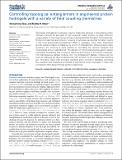Controlling topological entanglement in engineered protein hydrogels with a variety of thiol coupling chemistries
Author(s)
Tang, Shengchang; Olsen, Bradley D
DownloadOlsen_Controlling topological.pdf (3.456Mb)
PUBLISHER_CC
Publisher with Creative Commons License
Creative Commons Attribution
Terms of use
Metadata
Show full item recordAbstract
Topological entanglements between polymer chains are achieved in associating protein hydrogels through the synthesis of high molecular weight proteins via chain extension using a variety of thiol coupling chemistries, including disulfide formation, thiol-maleimide, thiol-bromomaleimide and thiol-ene. Coupling of cysteines via disulfide formation results in the most pronounced entanglement effect in hydrogels, while other chemistries provide versatile means of changing the extent of entanglement, achieving faster chain extension, and providing a facile method of controlling the network hierarchy and incorporating stimuli responsivities. The addition of trifunctional coupling agents causes incomplete crosslinking and introduces branching architecture to the protein molecules. The high-frequency plateau modulus and the entanglement plateau modulus can be tuned by changing the ratio of difunctional chain extender to the trifunctional branching unit. Therefore, these chain extension reactions show promise in delicately controlling the relaxation and mechanical properties of engineered protein hydrogels in ways that complement their design through genetic engineering.
Date issued
2014-05Department
Massachusetts Institute of Technology. Department of Chemical EngineeringJournal
Frontiers in Chemistry
Publisher
Frontiers Media S.A.
Citation
Tang, Shengchang and Olsen, Bradley D. “Controlling Topological Entanglement in Engineered Protein Hydrogels with a Variety of Thiol Coupling Chemistries.” Frontiers in Chemistry 2, no. 23 (May 2014): 1-11 © 2014 Tang and Olsen
Version: Final published version
ISSN
2296-2646